Aisha, Mother of the Faithful: The Scholarly Persona and Literary Critique - Part 1
Humanity owes a tremendous debt to two women who played key roles in preserving the Prophetic message in the manner it was delivered. One of them had the privilege of caring for the Noble Messenger and facilitating the means for him to convey his message. The other was honoured with the task of preserving this message and transmitting it to successive generations of the Muslim nation. Imam Shams al-Din al-Dhahabi (d. 748 AH / 1347 CE) remarked in his book "Siyar A'lam al-Nubala" (Biographies of Noble Figures): "I do not know of a woman in the nation of Muhammad (peace be upon him), indeed among all women, more knowledgeable than her!"
Between these two remarkable figures, the wheels of Islam turned, and its message spread across various corners of the earth. Khadijah bint Khuwaylid (Wafat 3 BH / 619 CE) - may Allah be pleased with her - provided the support to which the Prophet (peace be upon him) turned, steadfastly supporting and assisting him. He never forgot her contribution over the years, continuously acknowledging her virtues, saying: "She believed in me when people disbelieved, she supported me when people rejected me, and she provided for me when people deprived me." (Reported by Ahmad in al-Musnad).
As for Aisha (Wafat. 58 AH / 679 CE) - may Allah be pleased with her - she was the keen observer of the daily life of the Messenger (peace be upon him) and the attentive listener to the prophetic knowledge, thus becoming the first distinguished student in the Prophetic school. She possessed an innate readiness for rapid memorization, comprehension, and eloquence, qualifying her to lead a life rich in scholarly activity and service to the religion and the nation. She left behind a rich legacy for Muslim offspring in methodologies of legal reasoning, issuing religious verdicts, and balanced interpretation of texts.
This article series seeks to uncover aspects of Aisha's scholarly contributions, delving into the contours of her scholarly persona and her diligent efforts in understanding the textual sources of Islamic law. It examines the jurisprudential patterns in which she excelled in formulating legal opinions, sometimes differing with senior companions and supplementing them in numerous legal matters. It also discusses her awareness of the hierarchy of evidence in its strength and multitude. Furthermore, the study highlights her encyclopedic cultural and literary knowledge, as well as her human integrity, which enabled her to manage her emotions and sentiments towards others, knowing when emotions should yield to critical reasoning.
A Unique Upbringing
After the passing of Khadijah (may Allah be pleased with her), the Prophet Muhammad (peace be upon him) felt the need to remarry. He had children who needed care, so he chose Sawda bint Zam'a (d. 54 AH / 675 CE) - may Allah be pleased with her. She was a widow known for managing the household well and caring for children. Additionally, she had a delightful sense of humor, which the Prophet (peace be upon him) appreciated, as mentioned by Imam al-Dhahabi in "Siyar A'lam al-Nubala." The Prophet (peace be upon him) stayed with her for three years, devoting himself to matters of propagation and preparing for migration, ready for a new chapter in his mission.
When the Prophet (peace be upon him) settled in Medina, he found a remarkable personality nearby, uniquely qualified to preserve the Prophet's legacy and eager to acquire knowledge to transmit his teachings after his passing. This person was none other than Aisha, the daughter of his close companion in migration, Abu Bakr al-Siddiq (d. 13 AH / 635 CE). She was described as an extraordinary girl in her father's house. Her discipline, al-Sha'bi, marveled at her precision in jurisprudence and breadth of knowledge, asking, "What do you think of the etiquette of Prophethood?"
Aisha (may Allah be pleased with her) grew up in a household devoid of pre-Islamic ignorance, filled with love, mercy, and enthusiasm for the new religion. Her father, Abu Bakr, married her mother, Umm Ruman al-Kinaniyah (d. 6 AH / 628 CE), who had migrated from her homeland in the Sarat region (southern Mecca) with her first husband, Abdullah ibn al-Harith who had associated with Abu Bakr. When her husband passed away, this nobleman from the Quraysh tribe proposed to marry her, treating her with respect and kindness. She embraced Islam and excelled in it, and Aisha was the fruit of this noble family.
"Aisha was born into Islam," as stated by al-Dhahabi in "Siyar A'lam al-Nubala." She grew up in a home that defended the message and its bearer, the Prophet (peace be upon him), from the moment it was revealed. She once said, "I never saw my parents disbelieve in Islam." She also once proudly declared, "The Prophet did not marry any virgin except me, nor did he marry any woman whose parents were both migrants except me." Her father, Abu Bakr al-Siddiq, was renowned for his service to Islam, and his trials were as well-known as Islam itself. As for her mother, Umm Ruman al-Kinaniyah, the Prophet (peace be upon him) bid her farewell on the day of her burial with his noble hands, saying, "O Allah, You know well what Umm Ruman encountered in You and in Your Messenger." This was recorded by Ibn Hajar al-Asqalani in his book "Al-Isabah fi Tamyiz al-Sahabah."
Literary Development
Her father took charge of her education, as he was not inovlved with the affairs that occupied the prominent Qurayshi families like Banu Hashim, Banu Umayyah, and Banu Makhzum. He dedicated himself to his trade and the welfare of his household. Aisha thus learned from him the sciences of her people, including eloquence, poetry, knowledge of Arab customs, and genealogy. Abu Bakr was described as "the closest relative of Quraysh to Quraysh," as mentioned by Ibn Hisham al-Hamiri in "Al-Sirah al-Nabawiyyah."
She excelled in all these arts. Aisha herself said, "The Messenger of Allah often used to ask me, 'O Aisha, what have you composed?' And I would reply, 'Which of my compositions do you want, O Messenger of Allah? They are many!'" (Reported by al-Tabarani in "Al-Mu'jam al-Saghir").
Ibn al-Qayyim, in "Zad al-Ma'ad," narrated that Imam Abu al-Zinad al-Madani said, "I have never heard anyone narrate poetry better than Urwah ibn al-Zubayr. When he was asked, 'What makes your narration so good, O Abu 'Abdullah?' He replied, 'How could my narration not be good when I have narrations from Aisha? Whenever anything came down, she would recite poetry about it!'"
Her skill in narrating poetry and critiquing it is evident from the fact that she judged young poets among the Companions based on their emotions. The famous historian and exegete al-Tabari mentioned in "Tahdhib al-Athar" that Urwah ibn al-Zubayr and Marwan ibn al-Hakam once engaged in a poetry competition at her house while she listened from behind a curtain. At the end of their contest, she judged in favour of Marwan due to his poetic talent, telling her nephew Urwah, "Marwan has inherited poetic talent which you lack!"
Urwah ibn al-Zubayr was one of the fruits of Aisha's guidance, and he became one of her outstanding students. He became so knowledgeable that senior Companions would consult him about matters of religion. It's narrated that, Urwah said mentioning transfer of knowledge from Aish to him, "Aisha did not pass away until I left her three years before," according to Imam Jamal al-Din al-Mizzi in "Tahdhib al-Kamal." Al-Dhahabi, in "Al-Siyar," mentioned Hisham ibn Urwah, saying, "I have not seen anyone more knowledgeable about the Quran, obligations, halal and haram, poetry, Arab tradition, genealogy, or the sayings of the Arabs and lineage than Aisha."
Innate Qualities
Aisha possessed two innate qualities that made her a vessel for prophetic knowledge. The first was a natural aptitude for rapid memorization, good comprehension, and eloquent expression. It is not an exaggeration to describe her as having a photographic memory, as she could retain everything. Thus, she memorized a hadith upon hearing it for the first time, as happened in her account of the Battle of the Camel in 36 AH/657 CE, and in her narrations of poems recited by the Banu Zabba' who were mourning their slain ones while circling around her hujra (chamber).
Her quick comprehension of the Prophet's teachings and excellent articulation are evident in a narration by Imam al-Bukhari, in which she describes a woman asking the Prophet about how to purify herself after menstruation. The Prophet instructed her, but the woman asked for clarification several times. Aisha intervened, understanding the intended meaning and explaining it effectively despite the sensitivity of the topic.
Her first student, Urwah, marvelled at her encyclopedic knowledge, especially in medicine. He once said to her, "O my mother! I am not surprised by your understanding, for you are the wife of the Messenger of Allah and the daughter of Abu Bakr, and I am not amazed by your knowledge of poetry and the customs of the people, for you are the daughter of Abu Bakr, and he was among the most knowledgeable. But I am amazed by your knowledge of medicine. How did you learn it? From where?" She replied, "When the Messenger of Allah fell ill during his final illness, various Arab tribes would send remedies for him, and I would administer them. That's how I learned medicine."
Her statement "That's how I learned medicine" demonstrates her pragmatic approach to learning—a mere trial was enough for her to master it. Another narration by al-Dhahabi in "Tarikh al-Islam" supports this, where Hisham ibn Urwah, her nephew, quotes her: "I used to hear people prescribing remedies to each other, and I would memorize them."
The second quality was her ability to direct and mold her personal qualities of possessiveness, assertiveness, and courage toward fulfilling her mission. Aisha was fiercely possessive, a trait understandable as she was her mother's only child, pampered and isolated from other girls in her family, surrounded by boys. When she was with the Prophet, she always given priority. The concept of competition was ingrained in her from an early age, and her possessiveness was intense.
This possessiveness and protective mind once led her to break a plate of food given as a gift by one of the Prophet's wives, prompting the Prophet to remark, "Your mother is possessive." Moreover, she expressed her unease regarding the kunyas (titles) given to her companions, asking the Prophet to give her, nephew, Asma's son, Abdullah ibn al-Zubayr’s name, as her kunya. Thus, Aisha became known as "Umm Abdullah."
(Will continue)
(Translation of Article published originally in Arabic in Al Jazeera Thurath. This series is published in 3 parts)
Disclaimer
The views expressed in this article are the author’s own and do not necessarily mirror Islamonweb’s editorial stance.

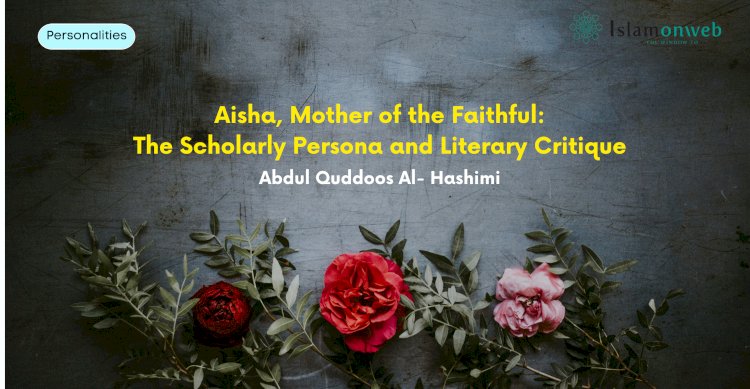


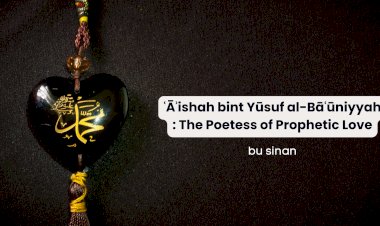
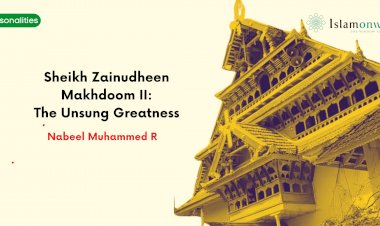
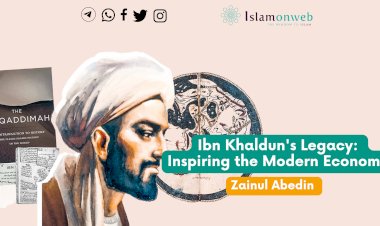
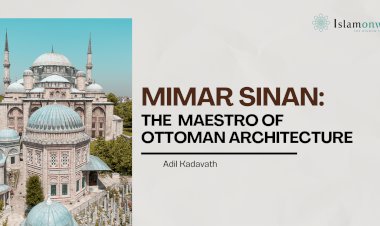
















Leave A Comment